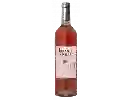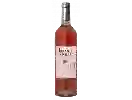
Château Mas NeufCompostelle Rouge
This wine generally goes well with beef, game (deer, venison) or lamb.
Food and wine pairings with Compostelle Rouge
Pairings that work perfectly with Compostelle Rouge
Original food and wine pairings with Compostelle Rouge
The Compostelle Rouge of Château Mas Neuf matches generally quite well with dishes of beef, lamb or game (deer, venison) such as recipes of cabri en colombo with creole sauce, baekenofe (alsatian meat stew) or duck casserole with turnips.
Details and technical informations about Château Mas Neuf's Compostelle Rouge.
Discover the grape variety: Mourvèdre
Mourvèdre noir is a grape variety originating from Spain. It produces a variety of grape specially used for wine making. It is rare to find this grape to eat on our tables. This variety of grape is characterized by medium to large bunches, and grapes of medium size. Mourvèdre noir can be found in several vineyards: South-West, Cognac, Bordeaux, Provence & Corsica, Rhône valley, Languedoc & Roussillon, Loire valley, Savoie & Bugey, Beaujolais.
Informations about the Château Mas Neuf
The Château Mas Neuf is one of of the world's great estates. It offers 37 wines for sale in the of Costières-de-Nîmes to come and discover on site or to buy online.
The wine region of Costières-de-Nîmes
The wine region of Costières-de-Nîmes is located in the region of Rhône méridional of Rhone Valley of France. Wineries and vineyards like the Domaine Scamandre or the Château d'Or et de Gueules produce mainly wines red, pink and white. The most planted grape varieties in the region of Costières-de-Nîmes are Mourvèdre, Roussanne and Viognier, they are then used in wines in blends or as a single variety. On the nose of Costières-de-Nîmes often reveals types of flavors of non oak, thyme or raisin and sometimes also flavors of clove, cocoa or coffee.
The wine region of Rhone Valley
The Rhone Valley is a key wine-producing region in Southeastern France. It follows the North-south course of the Rhône for nearly 240 km, from Lyon to the Rhône delta (Bouches-du-Rhône), near the Mediterranean coast. The Length of the valley means that Rhône wines are the product of a wide variety of soil types and mesoclimates. The viticultural areas of the region cover such a distance that there is a widely accepted division between its northern and southern parts.
The word of the wine: Carpentry
A powerful red wine with a dense, rich body and a tight tannic structure.













